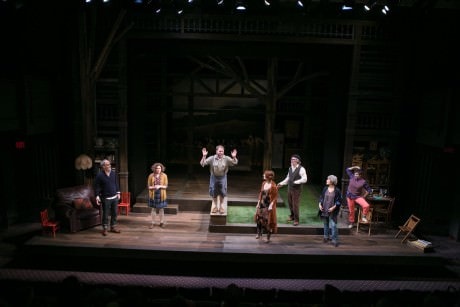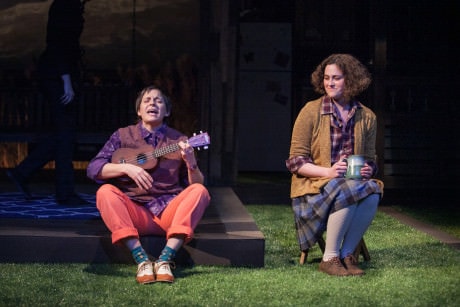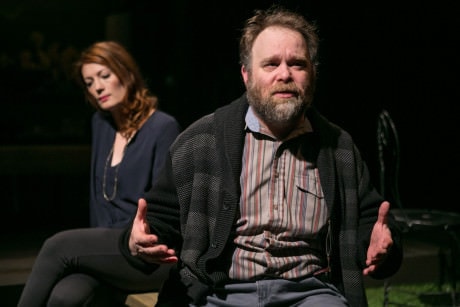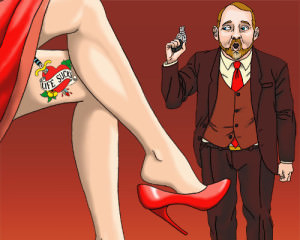An intriguing question runs through Life Sucks (Or the Present Ridiculous), which is whether in fact life sucks or not. Is life inherently such a bummer that there’s no point going on? Or is life itself its own darn good reason for hope and optimism?

In Theater J’s delightful new production—Writer/Director Aaron Posner’s metatheatrical mashup of melancholy and hilarity—the question becomes like an insistent riddle, not just a brainteaser but a soul perturber. As Posner’s seven idiosyncratic characters confront the question over the course of two acts—one by one, each with a different agony, a different angle of vision, a different self-referential obsession—something quite extraordinary happens inside Goldman Theater. The question becomes the audience’s too. That curious question hovering over the entertaining action on stage leaps out into the house and becomes everyone’s own.
Not to give this show away, but if you don’t walk out afterward feeling utterly uplifted, the intrinsic value of your loves, losses, and longings (flaws and all) validated—you might want to check your pulse. Because Life Sucks is one of the most exhilarating and life-affirming experiences in the theater you’re ever likely to have.
You might not think that watching all these characters lament their sadsack woebegone lot in life would turn out to be enjoyable and oddly edifying. The secret of course is Chekhov, from whose Uncle Vanya Posner has cheekily lifted situations and character relationships. However far from Chekhov’s original Posner’s “irreverent variation” ranges, the genius of Life Sucks is that it stays faithful to the genius of Chekhov. Like Stupid Fucking Bird (Posner’s accolade-laden take on Chekhov’s Seagull), Life Sucks delivers a cornucopia of theatrical jokes, stunts, and silly bits. But Life Sucks goes much deeper. Life Sucks plumbs real pain and illuminates life right now, in the ridiculous present.
An array of unrequited loves and lusty longings propels the rom-com action, and the story unfolds in a country home that has seen better days (Set Designer Meghan Raham has given it ramshackle charm and a lot of mismatched chairs).
At the beginning the actors come out on stage and talk to us out-of-character. The world of the play is both a stage peopled with naturalistic characters and a platform for the actors playing them to address the audience directly, which happens quite often. Strings of lightbulbs hung over the audience (by Lighting Designer Nancy Shertler) fade up when that’s about to happen and fade out when the action resumes onstage. Visually it’s a nifty transition, but it also cleverly sets up a connection between our own living presence and the characters’ inner lives.
A character nicknamed Pickles (played touchingly by Kimberly Gilbert, who manages to combine morose with hopeful) opens the play strumming a ukelele and singing the Beatles’ “Octopus’s Garden.” Later in the first act Pickles has a monologue about how she never stops loving all the people she has ever loved—in particular Iris, a woman who left her. So moving is Gilbert’s performance of this amazing speech that if it were a musical number it would stop the show. And that speech serves to signal that all the play’s light ‘n’ quirky comedy is grounded in authentic human heartache.

Sonia (played with equal parts gusto and sexual frustration by Judith Ingber) has the hots for the handsome gymrat doctor Astor (the strapping Eric Hissom), who in turn has the hots for the stunningly beautiful Ella (played with elegant intelligence by Monica West), who in turn is married to the much older Professor (a cranky pedant played amusingly by John Lescault). Babs (the down-to-earth Naomi Jacobson) gives Sonia the dish on a youthful fling she had with Astor—the point being: move on (thus refuting Pickles’ infatuation in perpetuity). Meanwhile, the disheveled, despondent Vanya (as played by Sasha Olnick a perfect buffoon for love) is horny for Ella as well.
There’s a scene in act two when Vanya, bereft of dignity, his life a hopeless shambles, faces all the other characters on stage who, like a tribunal, ask him one by one the same question, “Am I supposed to feel sorry for you?” followed by their own story about how life sucks for them. The cumulative effect of this testimony is such a piling on of human comedy that the gales of laughter can scarcely gasp for air.
Some of the richest and most revelatory exchanges in Life Sucks are about the difference between how life treats women considered attractive and women considered unattractive. (“Life” in that sentence being a placeholder for “men.”) Sonia is especially beset by insecurities about her plain looks. Ella’s problem is that she is dogged by men’s incessant desires. All this is in Chekhov’s text, but what Posner has made of it for these our modern times is brilliant. For instance there’s a passage when Ella, no mouseburger she, defiantly takes a stand. As those dangling overhead lightbulbs come on, she asks the audience point-blankly: “How many would like to have sex with me?” (The night I saw the show, some hands went up.) Then Ella takes it further, confrontationally not toyingly, as if expecting a real answer: “How many are dying to sleep with someone other than the one you are supposed to?” As she goes on in this vein, it’s as if she becomes a one-woman wonder, a hollaback heroine, defending the bodily integrity of her gender with excoriating exuberance.

There are similarly contemporary comedic riffs in Life Sucks about old age, workaholism, loneliness, and more. What’s remarkable about this provocative play is not only how much Posner has packed into it but also what he has left out. There’s not a hella godtalk. No Hallmark card spirituality. Not a nod to any creed. Yet Life Sucks sings a song of life’s worth that one cannot help but keep humming. (Pickles’ last tune, tellingly, is John Lennon’s “Imagine.”)
At one point a character flips the question: If life doesn’t suck, what does it do?
Well, for one thing, it grants some fortunate theatergoers the satisfaction of seeing Life Sucks.
Running Time: Approximately two hours and 10 minutes, with one 15-minute intermission.
Life Sucks plays through February 15, 2015 at Theater J at The Washington DCJCC’s Aaron & Cecile Goldman Theater – 1529 16th Street, NW, (16th and Q Streets), in Washington, DC. For tickets, call the box office at (800) 494-8497, or purchase them online.
RATING:





